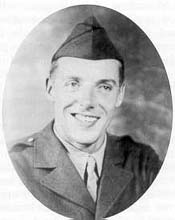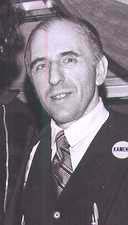 Instrumental in Putting an End to Federal Discrimination Sued the U.S. Government to be Reinstated after Firing |
|
Compiled by GayToday Courtesy of David K. Johnson, Ph.D. and Franklin E. Kameny, Ph.D.
"That case, Scott v. Macy, was one of the first major gay rights legal victories and was instrumental in leading to an end of twenty-five years of anti-gay discrimination in the federal civil service. "Scott was a former officer in both the Mattachine Society of Washington and Mattachine Midwest, and was inducted into the City of Chicago Gay and Lesbian Hall of Fame in 1993 (see profile below). "Born in Portland, Oregon, Scott graduated from Chicago's Tilden Technical High School and received a B.A. from the U of Chicago in 1933. He went on to serve in the Army and worked for the U.S. Department of Labor for nearly twenty years before being forced to resign in 1956. "Scott participated in the State of Illinois Constitutional Convention of 1969-1970, during which he drafted a proposal for a new constitution for the State of Illinois. He also served as a volunteer at Horizons. "Bruce Scott died on December 26, 2001 of Parkinson's disease at the age of 89. At Scott's request, there was no funeral or memorial service. He is survived by his longtime companion Larry Bloom." Chicago Gay and Lesbian Hall of Fame 1993 Inductee Profile for Bruce Scott By David K. Johnson, Ph.D. Bruce C. Scott - Now 81 years of age and a resident of Chicago for more than 50 years, Bruce Scott played an important, if seldom recognized, role in the history of the gay civil rights movement at the national level in the pre-Stonewall period. A federal government employee during the Joe McCarthy era, Scott was one of hundreds of gay men who lost their livelihood. But unlike most, he fought the discriminatory practices of the federal government in court, thereby providing the nascent gay movement of the 1960s with one of its earliest successes. His suit paved the way for the 1975 reversal of the federal Civil Service Commission's exclusion of gays and lesbians. Scott was to the 1960s and civil service employment what Keith Meinhold and Joe Steffan are to the 1990s and military service. Bruce Scott moved to Chicago in 1922, at the age of ten, with his recently divorced mother. Living on the South Side, he was graduated from Tilden Technical High School, attended Armour Institute of Technology [now known as the Illinois Institute of Technology], and received a Bachelor of Arts in Political Science from the University of Chicago. Scott's first job out of college was with the Corporation Counsel's office of the City of Chicago.
Mattachine, under the leadership of Frank Kameny, quickly adopted an activist, civil liberties agenda. Following the models of the NAACP and ACLU , the group supported a number of test discrimination cases in the courts. Bruce Scott, who served as the group's Vice-President and Secretary, was the litigant in one of the most significant such cases. In 1965, the Federal Court of Appeals ruled in Scott vs. Macy that a vague charge of "homosexuality" was not grounds for disqualification from federal employment. Vector, a San Francisco gay publication, remarked that "a candle has indeed been lighted" for the gay and lesbian community. When the government attempted to present more specific charges against Scott, the Court of Appeals in 1968 again found in his favor. In 1975, having lost a number of similar cases, the Civil Service Commission was forced to suspend its discriminatory exclusion of gays and lesbians. This policy change not only affected thousands of federal employees and contractors, but it set the standard for employment practice throughout the country. During his protracted litigation, Scott was under a great financial burden because of his inability to work for the federal government. After intermittent periods of unemployment and under-employment, Scott left Washington, moved back to Chicago and began working for the State of Illinois, from which he retired after 20 years of service in 1985. Bruce Scott is Remembered by Franklin E. Kameny, Ph.D.
"Bruce saw that, wanted to fight, contacted me, and we discussed his case. I referred him to the ACLU, which had a Washington office (through which my own case had been handled in its earlier judicial stages), although not a national chapter yet. "In due course they took his case, and assigned it to David Carliner, who became the first Chair of their Board, when the national chapter was founded on November 8 in that year. David always remained proud of his role in that case. "His case (Scott v. Macy -- John W. Macy was the infamous U. S. Civil Service Commission Chairman of the day) was won in the then-very-liberal U.S. Court of Appeals for the D.C. Circuit, under Judge Bazelon, in 1965. "It was our first major victory in that context. The U.S. Civil Service Commission then reformulated and re-brought the charges against him, and the case went through the entire administrative and judicial appeal process a second time as Scott v. Macy II. He won it again in 1968, whereupon the CSC announced that they were giving up on him (although not on the issue -- yet). It paved the way for the landmark Norton V. Macy, in 1969. "As a result of his contact with me, he became involved in Washington Mattachine from the very outset, when we were formed on November 15, 1961, and became, from time to time, our Vice President, and our Secretary and, I believe, testified with us at the Dowdy hearings. "He eventually moved back to Chicago, whence he had originally come, and got a job with the Illinois state Labor Department, which led him back into the Federal civil service in due course. He retired long ago, of course. I saw him a few years ago when I went to Chicago for a conference. "Bruce C. Scott was a true gay rights pioneer, one of the first employees to fight the vigorously and viciously enforced governmental policies totally excluding gays from government employment from the 1950s through the 1970s, which destroyed the careers of thousands of gay people, and was the first to win his case in the courts, first in 1965 and again in 1968, paving the way for the final reversal of those policies in 1975. "Starting in 1961, his fight against government homophobia moved him into the forefront of the newly-formed activist gay movement in Washington, D. C., from which he later moved to Chicago to reap the harvest of his victory by resuming his career in state and federal governmental service." |



